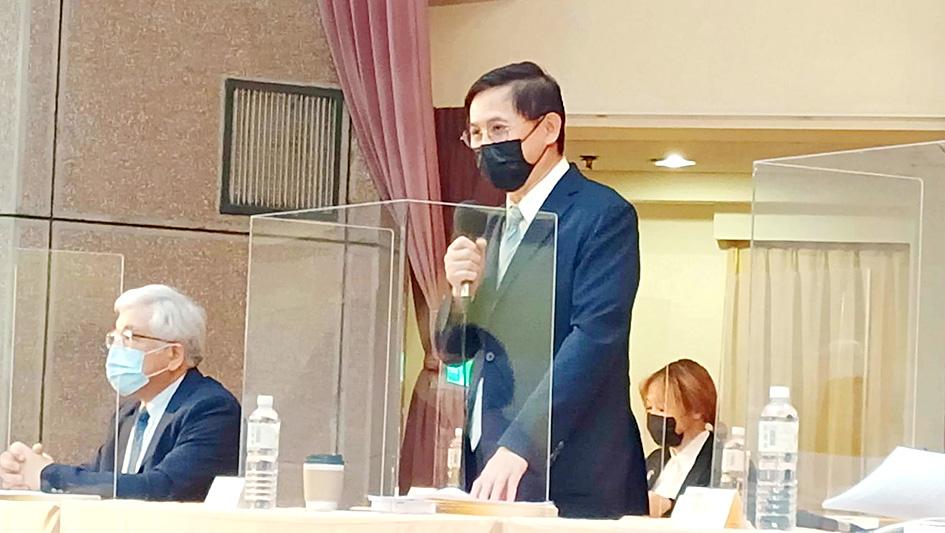Pegatron Corp (和碩), one of Apple Inc’s iPhone assemblers, yesterday said it is planning to expand manufacturing sites in Vietnam, India and North America to meet customer demand for production diversification, amid supply chain chaos attributable to the fallout of the COVID-19 pandemic.
The unpredictable effects of COVID-19 and unstable supply chains have increased uncertainty worldwide regarding consumer demand and the shipping of products, Pegatron said in its annual report.
“Pegatron will continue monitoring the supply of key components and working closely with its suppliers to optimize capacity allocations,” the company said.

Photo: Huang Hao-chen, Taipei Times
The remarks came as the firm held its annual general meeting in Taipei, where shareholders approved the distribution of a cash dividend of NT$5 per share.
That represented a payout ratio of 64.85 percent based on the company’s earnings per share of NT$7.71 last year.
Pegatron’s board of directors last month approved a plan to invest an additional US$50.61 million to expand its manufacturing hub in North America, the company said in a regulatory filing.
Pegatron said it had already planned to invest US$164 million on production lines in North America so that it could accommodate an increase in orders in the region.
The company has factories in Taoyuan, as well as operations in Mexico, Indonesia and the Czech Republic, while China is still its most important manufacturing hub, with factories in Kunshan, Suzhou, Shanghai and Chongqing.
Pegatron expects an increase in demand for information technology products, especially commercial PCs, as people gradually return to the office, the annual report said, adding that the launch of Microsoft Corp’s Windows 11 operating system would stimulate PC replacement demand.
As communications products, such as smartphones, are affected by seasonal cycles, Pegatron said it plans to boost production efficiency and improve management to navigate the industry’s ups and downs.
Last quarter, communication products were the biggest revenue contributor, accounting for 60 percent of total revenue, the company said.
This year, Pegatron expects its automotive electronics business to contribute more revenue, thanks to an increase in orders.

Vincent Wei led fellow Singaporean farmers around an empty Malaysian plot, laying out plans for a greenhouse and rows of leafy vegetables. What he pitched was not just space for crops, but a lifeline for growers struggling to make ends meet in a city-state with high prices and little vacant land. The future agriculture hub is part of a joint special economic zone launched last year by the two neighbors, expected to cost US$123 million and produce 10,000 tonnes of fresh produce annually. It is attracting Singaporean farmers with promises of cheaper land, labor and energy just over the border.

US actor Matthew McConaughey has filed recordings of his image and voice with US patent authorities to protect them from unauthorized usage by artificial intelligence (AI) platforms, a representative said earlier this week. Several video clips and audio recordings were registered by the commercial arm of the Just Keep Livin’ Foundation, a non-profit created by the Oscar-winning actor and his wife, Camila, according to the US Patent and Trademark Office database. Many artists are increasingly concerned about the uncontrolled use of their image via generative AI since the rollout of ChatGPT and other AI-powered tools. Several US states have adopted

KEEPING UP: The acquisition of a cleanroom in Taiwan would enable Micron to increase production in a market where demand continues to outpace supply, a Micron official said Micron Technology Inc has signed a letter of intent to buy a fabrication site in Taiwan from Powerchip Semiconductor Manufacturing Corp (力積電) for US$1.8 billion to expand its production of memory chips. Micron would take control of the P5 site in Miaoli County’s Tongluo Township (銅鑼) and plans to ramp up DRAM production in phases after the transaction closes in the second quarter, the company said in a statement on Saturday. The acquisition includes an existing 12 inch fab cleanroom of 27,871m2 and would further position Micron to address growing global demand for memory solutions, the company said. Micron expects the transaction to

A proposed billionaires’ tax in California has ignited a political uproar in Silicon Valley, with tech titans threatening to leave the state while California Governor Gavin Newsom of the Democratic Party maneuvers to defeat a levy that he fears would lead to an exodus of wealth. A technology mecca, California has more billionaires than any other US state — a few hundred, by some estimates. About half its personal income tax revenue, a financial backbone in the nearly US$350 billion budget, comes from the top 1 percent of earners. A large healthcare union is attempting to place a proposal before